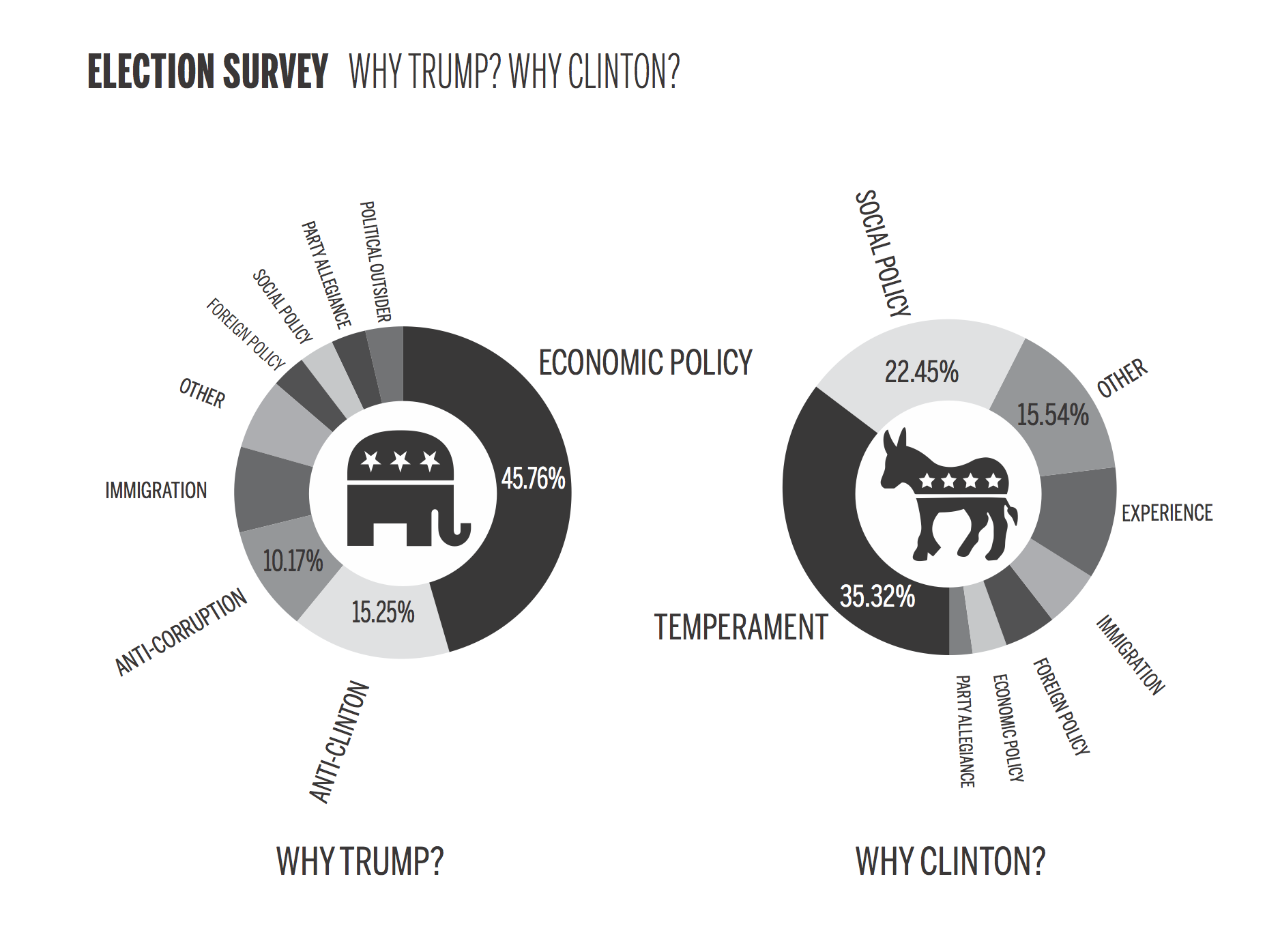
Hundreds of students have marched for women’s rights in cities across the country and gathered to protest Trump’s executive order on immigration in the weeks since President Donald Trump’s election.
But most Yalies who did not support Trump on Election Day cited neither his social policy nor his immigration policy but his temperament as the most influential factor in their decision not to support him, according to a News survey distributed just after the inauguration. Seven hundred and forty-three people responded, and the results were not adjusted for bias.
Of the 657 respondents who did not support Trump, 225 indicated that his temperament most influenced their decision not to support him. Concern with his social policy ranked second, with 143 votes. The “other” option was the third most popular, and students interviewed expressed that they had selected it because they opposed Trump’s stances on a variety of issues and could not pick the one that most influenced them.
George Gemelas ’18, who was among the 35.32 percent of respondents who ranked temperament as their main concern, said he feared the president’s inability to listen to others.
“As a human being and especially as a leader, it’s essential to be always listening in order to make the best decision,” Gemelas wrote in an email to the News. “Trump does not listen, it seems. He lacks the humility to know what others, especially experts, think about the things he says or does. Not listening threatens to undermine a key value in government today, but also sets a precedent for governments of the future.”
For Christopher Chen ’20, who also identified temperament as the primary reason he did not support Trump, said the president’s rash and unpredictable behavior threatens both Americans’ belief in the legitimacy of government and the United States’ global standing. Chen wrote in an email to the News that “the way that [Trump] acts toward the press, the American people and other nations is volatile, unpredictable and rhetorically divisive.”
The survey also revealed that most students believed Trump would fail in all major fields of policy at the time that they filled out the survey. Out of 629 respondents, 440 said they were “unconfident” or “very unconfident” in Trump’s ability to improve national security, while 510 indicated that they were unconfident or very unconfident in his ability to improve the nation’s health care system. More than 80 percent of students indicated that they believed Trump’s immigration policy would “negatively” affect the country.
Nearly half of respondents, including 58 percent of female respondents, said they believed Trump’s policies would affect women “very negatively.”
“Any change altering a woman’s access to family planning, whether through the federal defunding of Planned Parenthood or clauses to corporate health plans that allow employers to opt out of contraception will negatively affect women,” Victoria Bentley ’17 said. “Any changes to federal or state aid for child care or public education will also disproportionately affect women, particularly low-income women, who are still the predominant caregivers for young children in this country.”
About 85 percent of respondents were unconfident or very unconfident in Trump’s ability to improve the U.S.’s international standing, and the majority of students indicated that they believed the nation would appear weaker or more divided within other countries during or after Trump’s presidency.
Edward Gelernt ’20 was among the 73.45 percent of respondents who indicated that they were very unconfident in Trump’s ability to improve the nation’s international standing.
“He’s a buffoon who basically acts in tantrums with no grasp on actual consequences, so him angering other world leaders is almost guaranteed,” Gelernt said. “We’ve already seen him ignore long-standing American conventions regarding China by taking a call from the Taiwanese prime minister, and any hope we might have had of improving relations with many Arab nations is pretty much gone with the travel ban.”
Students were slightly more optimistic about how the economy would fare under the new administration. Out of 629 respondents, 154 said they were confident or very confident in Trump’s abilities to create jobs and 146 said they were confident or very confident in his ability to increase economic growth. Just under 30 percent of respondents said they believed Trump’s business background would be “helpful” or “very helpful” in his efforts to stimulate economic growth.
Of the 59 respondents who backed Trump at the time of the election, 45.76 percent said they supported him mainly for reasons relating to economic policy. To one respondent, Angel Aguilera ’18, the successes of the new administration’s economic policies are already evident.
“Unfair trade agreements are being renegotiated,” Aguilera wrote in an email to the News. “Proposals for cutting U.S. funding to the scam that is the U.N. are being considered. President Trump is finally prioritizing our American economy rather than worrying about other countries.”
With 15.25 percent of the vote, anti-Clinton sentiment was the second most common reason for supporting Trump, followed by corruption in Washington and immigration.
Trump took office on Jan. 20.







